Earth Day 2017 March for Science
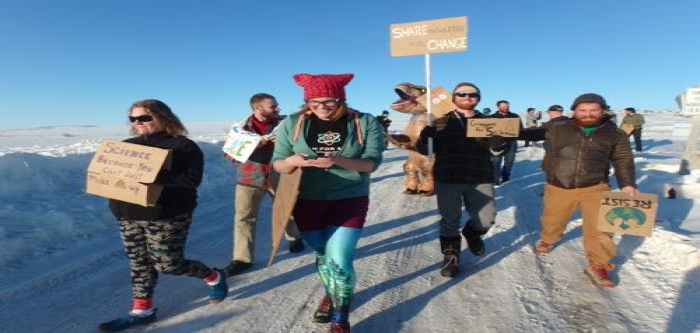 March for Science at Toolik Lake
March for Science at Toolik Lake
When I first heard of the March for Science, I was all in. There has been a lot of science denial recently, and I felt angry. Angry that people are demonizing science, as if it's a bad thing that we should fear rather than something everyone benefits from.
But then I realized something. For most people, it's probably just a misunderstanding. Most of us don't interact regularly with scientists, and don't really know what they do. Most of us couldn't name a single living scientist or their contributions. We hear the terms climate change, evolution, and GMO, and form opinions quickly based on what we think, or what we've heard, but not usually on what we know and understand. But I'm a science teacher, so let's see if I can break this down.
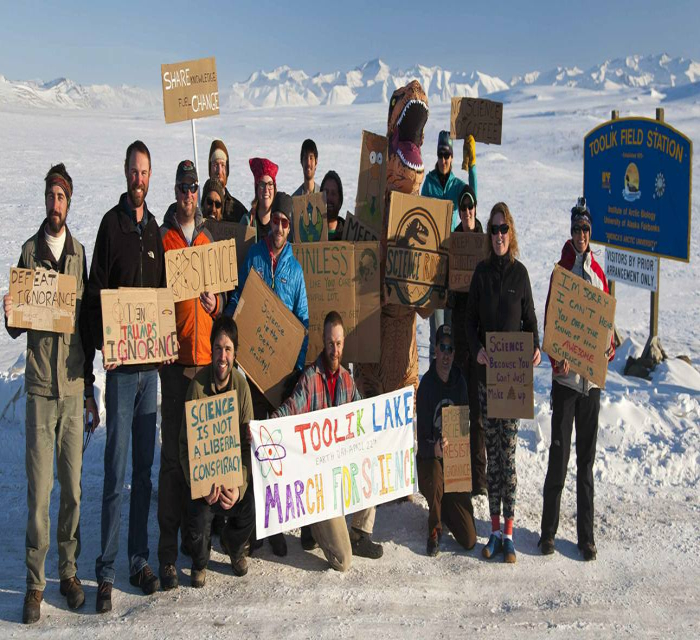 Toolik Lake March for Science. Photo courtesy of Ken Tape.
Toolik Lake March for Science. Photo courtesy of Ken Tape.
The Scientific Method
The great thing about science is that it's based on data gathered, not on feelings or beliefs. If you see something and don't understand it, you can ask questions about it, and then test those questions to see if what you think is happening is happening. If not, you can use what you've learned to formulate a new idea and a new approach. This is the scientific method.
![Steps of the Scientific Method. Image by Whatiguana (Own work) [CC BY-SA 4.0, via Wikimedia Commons] Scientific Method](/files/members/jennifer-baldacci/images/640px-scientific_method_3.jpg) Steps of the Scientific Method. Image by Whatiguana (Own work) [CC BY-SA 4.0, via Wikimedia Commons]
Steps of the Scientific Method. Image by Whatiguana (Own work) [CC BY-SA 4.0, via Wikimedia Commons]
This is what scientists spend their lives doing, whether it is in a lab in the search to cure cancer, or in the field to study hibernation in ground squirrels. It always begins with an observation. Scientists are good observers. They are curious. They find out what is known. They talk to each other. They develop hypotheses, ideas that haven't been proven yet, based on what is known. In the week I've been in the field so far, I have listened to infinite conversations about the research being done here and in other places, both on the job and after hours. It's clear that it is out of a real love for their work and wanting to understand, not because it happens to be their job or for the money. Few scientists earn enough to justify doing it for the money.
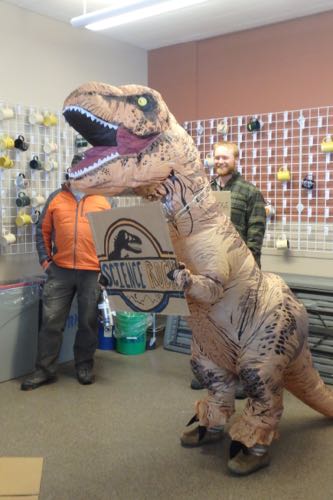 T. rex marches for science
T. rex marches for science
How Do I Know I Can Trust What I Read?
Scientists spend a lot of time designing experiments that will yield useful data, and they take very exacting measures to make sure those data are analyzed in statistically appropriate ways. They submit their research to peer-reviewed journals, which means that other scientists will read their work and question the method or statistical analysis if it is unclear, inaccurate or inappropriate. The work should be able to be replicated and the same results drawn again and again. This helps scientists develop theories. Remember, a scientific theory is different from the "theory", or hunch, you have about why you always get good grades when you wear a red shirt on a test day. A scientific theory is a valid explanation of what is happening. It is only called a theory when a lot of data has been collected that supports it. This term often gets misused in the media to make it look like scientists are just guessing about something. When they use the term theory in science, it is based on a lot of evidence.
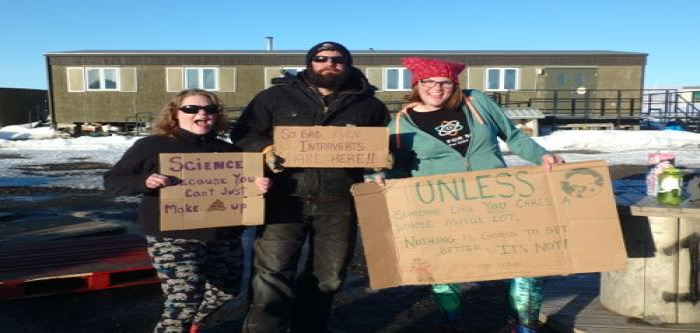 New friends and their signs for the march
New friends and their signs for the march
What Do I Get From Science?
Think of everything you own and know. That's what you get from science. Scientific discoveries make all of our lives better. Some of it is used to give us clean water, medicines, wifi, cars, and airplanes. Some of it is long-term data collected to monitor water quality, air pollution and squirrel movement over time. Applied research gives data that can be used immediately, like studying game species to allow sustainable hunting practices, for example. Basic research, like the kind we are doing with the ground squirrels, is used to learn new information about a species or system. It may be useful to humans in a specific way at a later date, but first it is necessary to understand the world around us and the organisms and complex interactions in it before we can apply that to the direct benefit of humans.
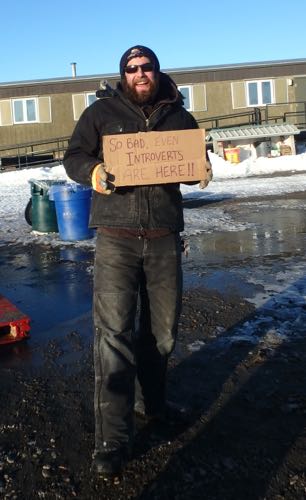 Travis expertly arranged the bonfire while we marched, but he was still all in with his sign.
Travis expertly arranged the bonfire while we marched, but he was still all in with his sign.
Are scientists all white lab-coat types sitting at a microscope?
It's also important to remember that scientists are real people. Some work in a lab, some work in the field. Some are quiet, some are chatty, many are hilarious. They go to concerts, they watch Star Wars and Dancing with the Stars. The love steak and quesadillas and Thai curry. And cookies. Especially cookies. With ice cream on top. They hunt, fish, eat meat, are vegetarians. They are Christians, Jews, Muslims, Atheists and more. They are your neighbors, parents, siblings and friends. They are passionate about their work and work hard to bring you real information. But they are not always good at communicating their work with non-scientists, just like I am not good at communicating with professional football players. We all move in different circles and don't always have the opportunity to reach everyone. It can make it hard to understand what scientists do and how they do it. I wanted to take time here for a shout out to say "Scientists are Awesome!"
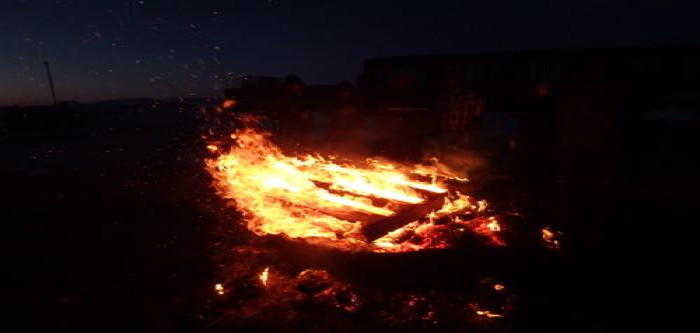 We ended the march at a bonfire and spent the next few hours there, turning like a rotisserie chicken so that no parts got too hot or too cold.
We ended the march at a bonfire and spent the next few hours there, turning like a rotisserie chicken so that no parts got too hot or too cold.
Why March for Science?
I decided to make the March for Science an opportunity to be thankful that we still have scientists willing to do the research that needs to be done. I want to encourage young people to go into careers in science. I want to encourage parents to tell their kids about the opportunities they have to do or learn about science. I also want to encourage everyone to communicate with their elected officials about the importance of all the research being done in all fields, and to keep funding it. We all gain so much from it. Science benefits everyone, no matter which political view you have.
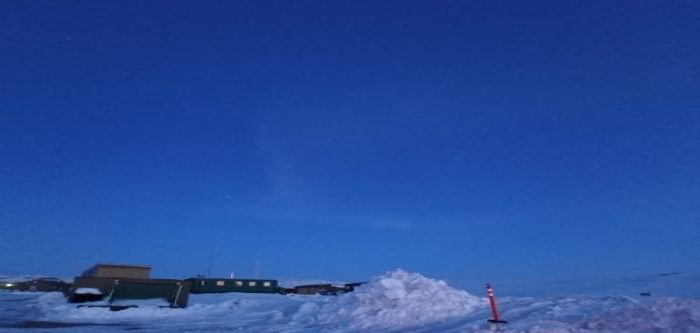 Peter pointed out the Aurora in the background. It was still fairly light for 11:30pm, and you could almost think it was wispy clouds. Almost.
Peter pointed out the Aurora in the background. It was still fairly light for 11:30pm, and you could almost think it was wispy clouds. Almost.
I thought I would have to miss the March, being away from home. But I was surprised and delighted to find out the official March scheduled here at Toolik Lake! So when I march for science, I march for all of us. For all we have learned so far, and all the information that is on the horizon.


Comments
Add new comment